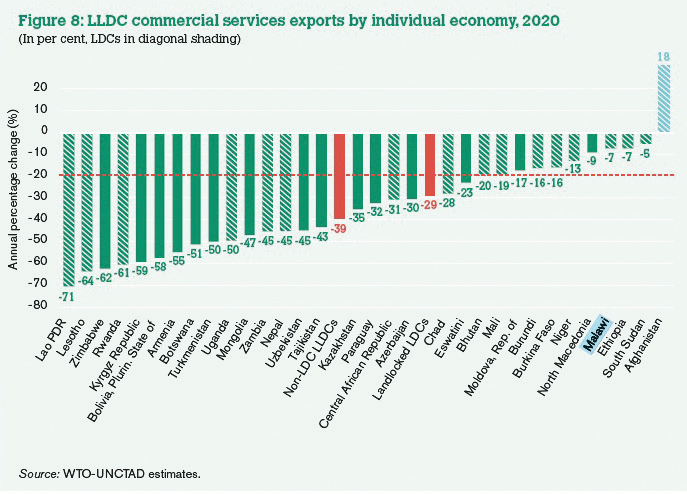High trade costs hit Malawi, others
World Trade Organisation (WTO) says while trade costs are high in many countries, those faced in Malawi and other landlocked developing countries (LLDCs) are higher.
Malawi is one of the world’s 32 LLDCs with no access to the sea and heavily relies on its neighbours known as transit countries to access international trade.

In its latest report titled Easing Trade Bottlenecks in Landlocked Developing Countries, WTO says the high trade costs translate to competitive disadvantages for the LLDCs.
Reads the report in part: “LLDCs’ trade costs are 1.4 times higher than those of developing countries with a coastline. LLDCs’ already fragile trade and economic situation has further been exacerbated by measures taken by governments to combat the Covid-19 pandemic.
“The LLDCs are facing numerous challenges when trading internationally, which include supply chain constraints, reliance on transit countries for imports and exports and the repercussions of the Covid-19 pandemic on LLDCs’ economies.”
The report shows that LLDCs’ exports between April 2019 and April 2020 declined by 40 percent and as a whole, LLDCs represent 1.105 percent of world trade as of 2019.
In a statement accompanying the report, WTO director general Ngozi Okonjo-Iweala has committed to promoting a more inclusive multilateral trading system.
She observed that LLDCs face particularly acute versions of realities that all members must grapple with, as complex emerging challenges, such as climate change, threaten development possibilities and future prosperity.
Okonjo-Iweala said: “We must leverage the potential of trade to meet these challenges. We must also ensure that the gains from trade are equally distributed.
“In a world marked by the Covid-19 pandemic, the paths that lead to economic growth cannot be separated from those that lead to inclusion.”
WTO has since recommended that Malawi and others should strengthen their infrastructure and connectivity with the world to reduce logistics and transport costs and achieve greater commercial and economic activity.
“LLDCs need to put digital technology at the forefront of policy objectives and adapt to rules of origin. These measures can help ease LLDCs’ trade-related logjams and enhance their participation in the multilateral trading system. They will also help to promote LLDCs’ economic recovery and boost their resilience to crises,” reads the report.
Ministry of Trade spokesperson Mayeso Msokera admitted in an interview on Tuesday that Covid-19 has affected trade in Malawi as a landlocked country.
He underscored the importance and need for integration to bolster trade.
Msokera noted that trade between Malawi and other countries has been minimal where intra- African trade currently, accounts for less than 16 percent of the continent’s total trade, mainly because of poor support infrastructure, weak connectivity, low production capacity and over dependence on primary commodities.
Currently, data contained in the 2021 Annual Government Economic Report shows that Malawi has continued to register a negative trade balance.
In 2020, for instance, exports decreased by 36 percent to $730 million from the $1.15 billion that was recorded in 2019.
The decrease, according to government, was largely attributed to effects of Covid-19 which affected returns from the Country’s major exports.
These developments saw Malawi’s merchandise trade balance soaring to $2 billion, representing a seven percent increase from $1.903 billion, the highest in the last nine years.





